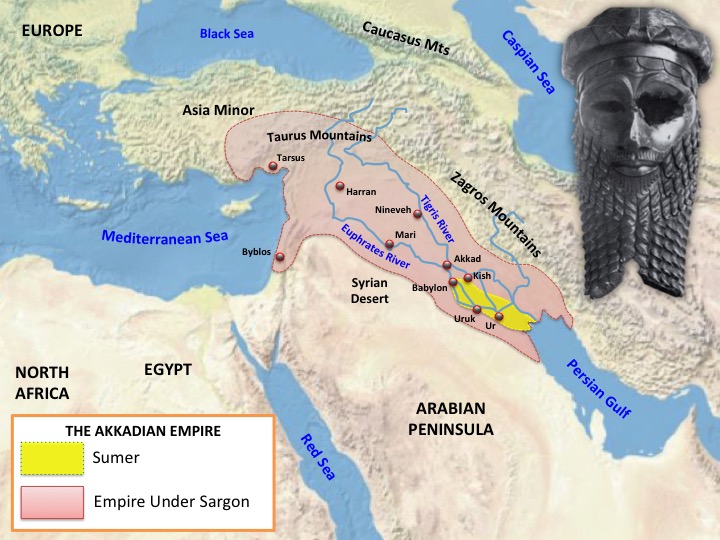It’s a bit of a cliché to say empires rise and fall, but have you ever wondered what the oldest empire in recorded history was? Well that title seems to go to the Akkadian Empire, the first known multinational empire in the world.
The Akkadian Empire existed for a short time between 2334-2218 BCE, and was founded by Sargon the Great (or Sargon of Akkad), probably its most famous ruler. But despite its relative short existence, this ancient empire set a range of world “firsts” that were replicated and standardized by later rulers.
Centered on the city of Akkad, the Akkadian Empire united the region of southern Mesopotamia (ancient Iraq) that had previously been ruled by competing city states (including Ur, Uruk, Lagash, Kish, Mari and Ebla), each with its own dynastic rulers (a period known as the Early Dynastic, which existed from around 2900 to 2350 BCE).
Akkad (sometimes Agade) has not yet been located by archaeologists, but it is thought to have been located along the western bank of the Euphrates river, somewhere between the ancient cities of Sippar and Kish. However, others believe it was located between the cities of Mari and Babylon, while others think it was elsewhere entirely.

This is one representation of the Akkadian Empire under the reign of Sargon, though it should be noted historians are still not sure where Akkad is.
Regardless of where it was exactly, the city exerted considerable influence over the surrounding region. According to Sargon (or his scribes), Akkadian control eventually extended from the Persian Gulf through Asia Minor to the Mediterranean Sea and Cyprus. There are some, however, who argue that the empire extended as far as Crete, in modern Greece.
By uniting so many previously antagonistic states, Sargon and his successors were able to introduce trade routes, allowing goods to flow safely from northern Mesopotamia to the south, via the Euphrates river. Stability in the region also allowed for the development of art, literature, agriculture, and the sciences. And, for a short time, Akkadian became the lingua franca in the region, temporarily replacing Sumerian in all things but sacred ceremonies and rites.
The Akkadians even introduced the first postal system, whereby clay tablets with cuneiform Akkadian script were encased in clay that was then marked with the name and address of the intended recipients. The only way to “open” these clay envelopes was to break them, which meant it was easy to know if someone was reading your mail.
Sargon was a shrewd ruler, positioning his most trusted followers in positions of influence across his territories – one of the more significant being his daughter, Enheduanna, who became High Priestess of Inanna at Ur. Enheduanna, now recognized as the world’s first author, was able to assert significant influence through religious and cultural affairs due to her position.
Sargon himself reigned for 56 years and was succeeded by his son Rimush, who continued his policies. However, his early reign was characterized by various rebellions from previously conquered cities and a struggle to regain order. Rimush only ruled for nine years before he died and was succeeded by his brother, Manishtusu, who also had to quell rebellion in the earlier years of his reign. How Manishtusu died remains unclear, but it is possible he was killed by his courtiers.
Then came Naram-Sin, Manishtusu’s son. Naram-Sin is recognized as one of the greatest Akkadian rulers, albeit a controversial one, who reigned for 36 years and expanded the boundaries of the empire and carried out various military achievements.

Akkadian Empire soldiers on the victory stele of Naram-Sin, circa 2250 BCE.
According to legend, Naram-Sin’s ambitions and hubris (he referred to himself as a living god) upset the Akkadian pantheon and brought about divine retribution, which led to the destruction of Akkad during the reign of his son, Shar-Kali-Sarri. Like his ancestors, Shar-Kali-Sarri faced violent rebellions throughout his reign but, so the story goes, was eventually defeated by an invading force of barbarians known as the Gutians, which ended the empire and brought about a new dark age.
Although there is no historical evidence to support the more fantastical elements of this story (of course), historians and archaeologists now believe climate change may have contributed to the empire’s collapse. In this modern interpretation of events, climate change caused a famine that not only disturbed trade, but ultimately weakened the empire so that it could no longer deal with the various rebellions or the eventual invasion.
The last kings of Akkad, Dudu and his son Shu-Turel, had no power comparable to the kings of the great empire. They could only extend their influence to the local area surrounding the city. Their names are rarely associated with the figures of their past and eventually even the city itself faded from memory, becoming just another legend and mystery.
Source Link: Akkadian Empire: The World’s First Recorded Empire?